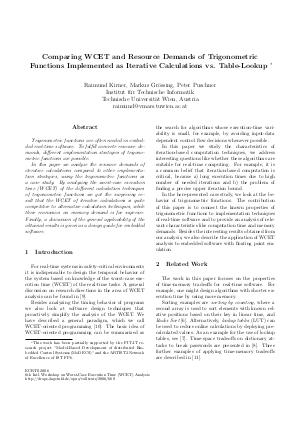Comparing WCET and Resource Demands of Trigonometric Functions Implemented as Iterative Calculations vs. Table-Lookup
Authors Raimund Kirner, Markus Grössing, Peter Puschner
-
Part of:
Volume:
6th International Workshop on Worst-Case Execution Time Analysis (WCET'06) (WCET 2006)
Part of: Series: Open Access Series in Informatics (OASIcs)
Part of: Conference: Workshop on Worst-Case Execution Time Analysis (WCET) - License:
 Creative Commons Attribution-NonCommercial-NoDerivs 3.0 Unported license
Creative Commons Attribution-NonCommercial-NoDerivs 3.0 Unported license
- Publication Date: 2006-08-23
File

PDF
OASIcs.WCET.2006.669.pdf
- Filesize: 249 kB
- 6 pages
Document Identifiers
Subject Classification
Keywords
- Worst-case execution time
- WCET analysis
- table lookup
- iterative computation
- Taylor series
- resource demands
Metrics
- Access Statistics
-
Total Accesses (updated on a weekly basis)
0Document
0Metadata
Abstract
Trigonometric functions are often needed in embedded real-time software. To fulfill concrete resource demands, different implementation strategies of trigonometric functions are possible. In this paper we analyze the resource demands of iterative calculations compared to other implementation strategies, using the trigonometric functions as a case study. By analyzing the worst-case execution time (WCET) of the different calculation techniques of trigonometric functions we got the surprising result that the WCET of iterative calculations is quite competitive to alternative calculation techniques, while their economics on memory demand is far superior. Finally, a discussion of the general applicability of the obtained results is given as a design guide for embedded software.
Cite As Get BibTex
Raimund Kirner, Markus Grössing, and Peter Puschner. Comparing WCET and Resource Demands of Trigonometric Functions Implemented as Iterative Calculations vs. Table-Lookup. In 6th International Workshop on Worst-Case Execution Time Analysis (WCET'06). Open Access Series in Informatics (OASIcs), Volume 4, pp. 1-6, Schloss Dagstuhl – Leibniz-Zentrum für Informatik (2006)
https://doi.org/10.4230/OASIcs.WCET.2006.669
BibTex
@InProceedings{kirner_et_al:OASIcs.WCET.2006.669,
author = {Kirner, Raimund and Gr\"{o}ssing, Markus and Puschner, Peter},
title = {{Comparing WCET and Resource Demands of Trigonometric Functions Implemented as Iterative Calculations vs. Table-Lookup}},
booktitle = {6th International Workshop on Worst-Case Execution Time Analysis (WCET'06)},
pages = {1--6},
series = {Open Access Series in Informatics (OASIcs)},
ISBN = {978-3-939897-03-3},
ISSN = {2190-6807},
year = {2006},
volume = {4},
editor = {Mueller, Frank},
publisher = {Schloss Dagstuhl -- Leibniz-Zentrum f{\"u}r Informatik},
address = {Dagstuhl, Germany},
URL = {https://drops.dagstuhl.de/entities/document/10.4230/OASIcs.WCET.2006.669},
URN = {urn:nbn:de:0030-drops-6694},
doi = {10.4230/OASIcs.WCET.2006.669},
annote = {Keywords: Worst-case execution time, WCET analysis, table lookup, iterative computation, Taylor series, resource demands}
}
